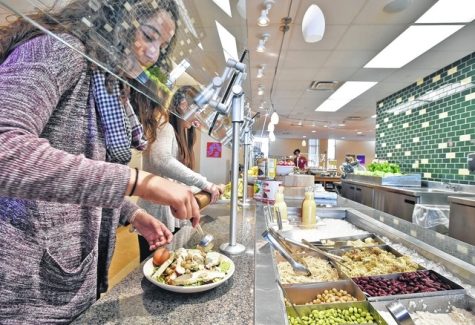How low can Aramark go?
If you’ve eaten on campus, or paid attention to the failed unionization drive last year you may think you already know the answer: pretty low. I thought I had a pretty good idea, until I read about the following.
On Aug. 21, 2009 inmates at the Aramark-run Northgate Prison in Kentucky rioted. The Lexington Herald-Ledger wrote a series of articles about the riots and their aftermath, reporting, “Inmates burned and damaged buildings, several of which were a total loss. Eight guards and eight inmates suffered minor injuries.” Inmates were rioting against poor food conditions provided by Aramark.
Aramark serves both colleges and prisons for a reason: the consumer, whether students or prisoners, have little or no control over selecting a food service provider, negotiating their contract, or affecting any issues that may occur down the road.
The parallels are forced by institutionalization: administrators are charged with lowering costs, unaffected by food quality and rewarded for savings.
Institutions have bureaucrats who insulate administrators from consumers like students or prisoners. The more these institutions can deny the humanity of the consumer, the more they can then deny that consumer’s basic human needs.
“The reason that it happened was poor food,” said Matt Huges, a corrections officer. He repeatedly insisted that Aramark’s food was inedible, inmates would not eat it, and inmates gambling over food purchased from the canteen precipitated the riot.
The questions I’m asking are: What is your relationship to the institution that houses you? Why is Aramark here? Are you happy with Aramark’s food service monopoly here on campus, and if not, what can you do about it? And if there’s nothing you can do about it, or have been made to feel that there is nothing you can do about it, then how is this your school?
Rep. Brent Yonts of Kentucky held hearings after the 2009 riot, and claimed that other Aramark run prison facilities had served brownies contaminated by feces, served feces in a burrito, and contained a pot of soup with a floating froth of worms.
“The issue is a matter of humanity,” Yonts said. “The issue is a matter of morality. And the issue is not a matter of money.”
Aramark representatives claimed that they had never received any complaints about their food from prisoners, according to the Lexington Herald-Leader.
Two years later, a state audit found Aramark violating food safety in prisons, and overbilling the state, a different story published by the Lexington Herald-Leader stated.
The auditor’s report found Aramark had stored food for too long, used less food than recipes called for, and used tablespoons of margarine in soup and peanut butter sandwiches to increase meal calorie counts. They also substituted brownies for meat at dinner.
Kentucky State Corrections Commissioner LaDonna Thompson went to bat for Aramark, speculating that prisoners did not like the food because of new, heart-healthy menus that reduced sugar and sodium.
Students obviously have much greater freedom than prisoners, but it is important that we work to see the parallels.
The students who live here and don’t own cars are very nearly trapped by Aramark’s monopoly, and it’s cruel to ignore them as we speed down the hill for tacos.
And even if we have the ability to go down the hill, why are we forced to pay these immoral thugs or go hungry here on campus?
Why was Aramark given this monopolistic contract on a term of years far beyond those we will spend here as students, creating an unchallengeable campus monolith?
These are all important questions, but what I’ve been asking myself is if I can stomach the food of a company I have good reason to believe fed other human beings feces.
If you search for news articles on Aramark, they are overwhelmingly by student papers, and overwhelmingly focus on poor food quality.
A few mention ongoing unionization struggles. But none mention the moral conflict we are faced with whenever we buy food from a corporation repeatedly charged with starving prisoners.
On top of every other reason we have to challenge the Aramark monopoly, we are being forced to vote with our dollars to support what many would consider a criminal enterprise.
Matthew Hughes, who gave testimony in the original hearings of Aramark in Kentucky, returned to the capitol years later and observed more general hearings on the food quality in Kentucky prisons out of personal concern.
He reiterated his belief that poor food is an important component of prison safety and played a role in the riot. He summed the problem up with a simple eloquence that applies equally well to us here at CSUEB. “If you’re hungry, you’re going to get ornery,” he said.














